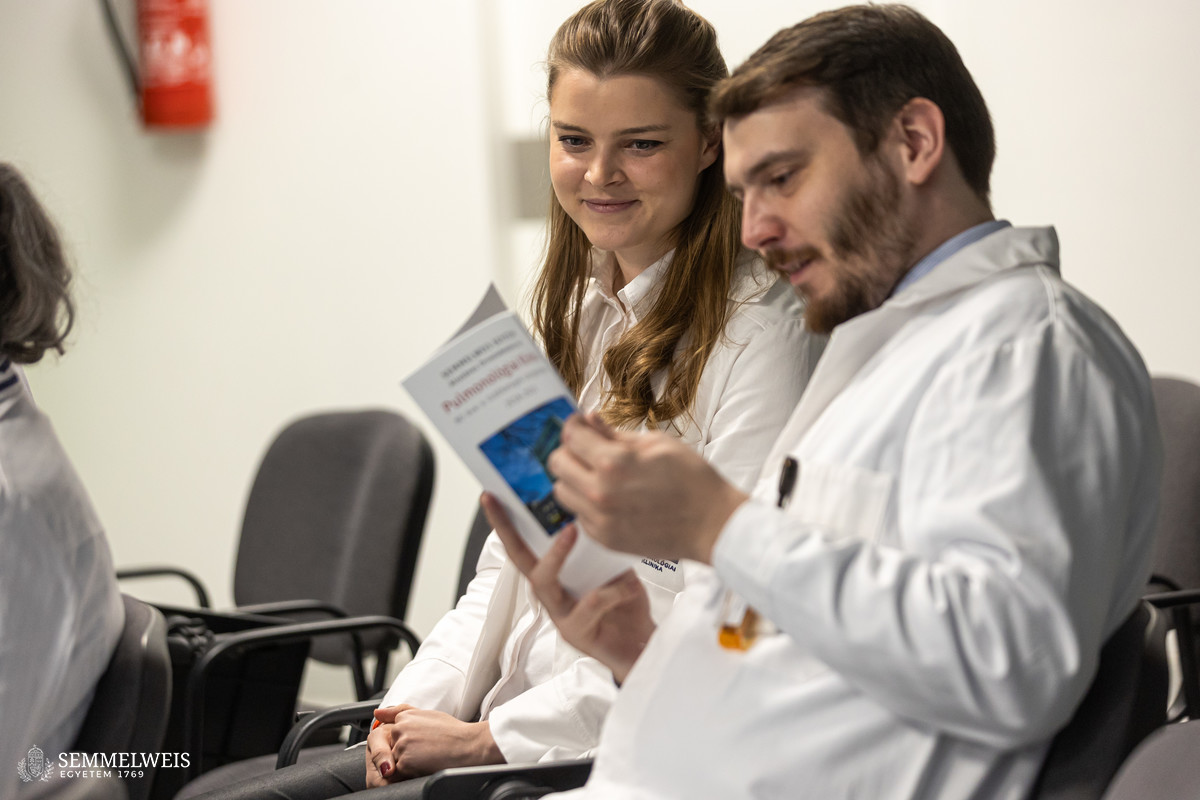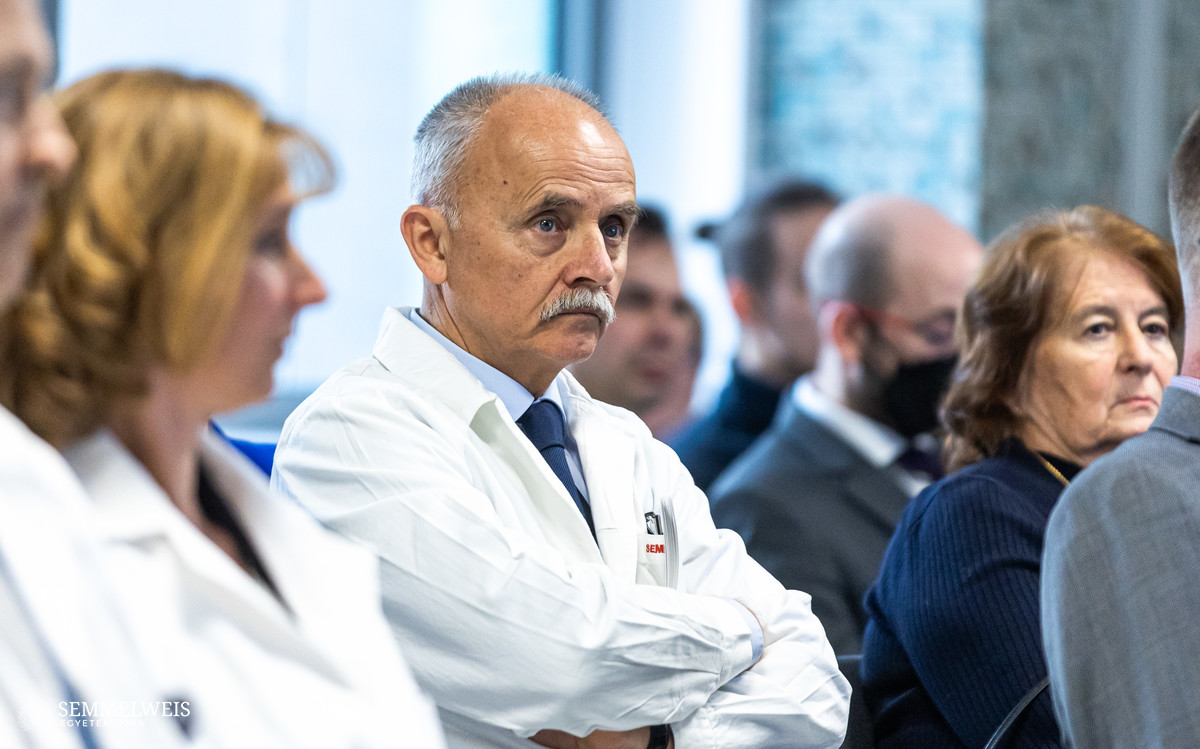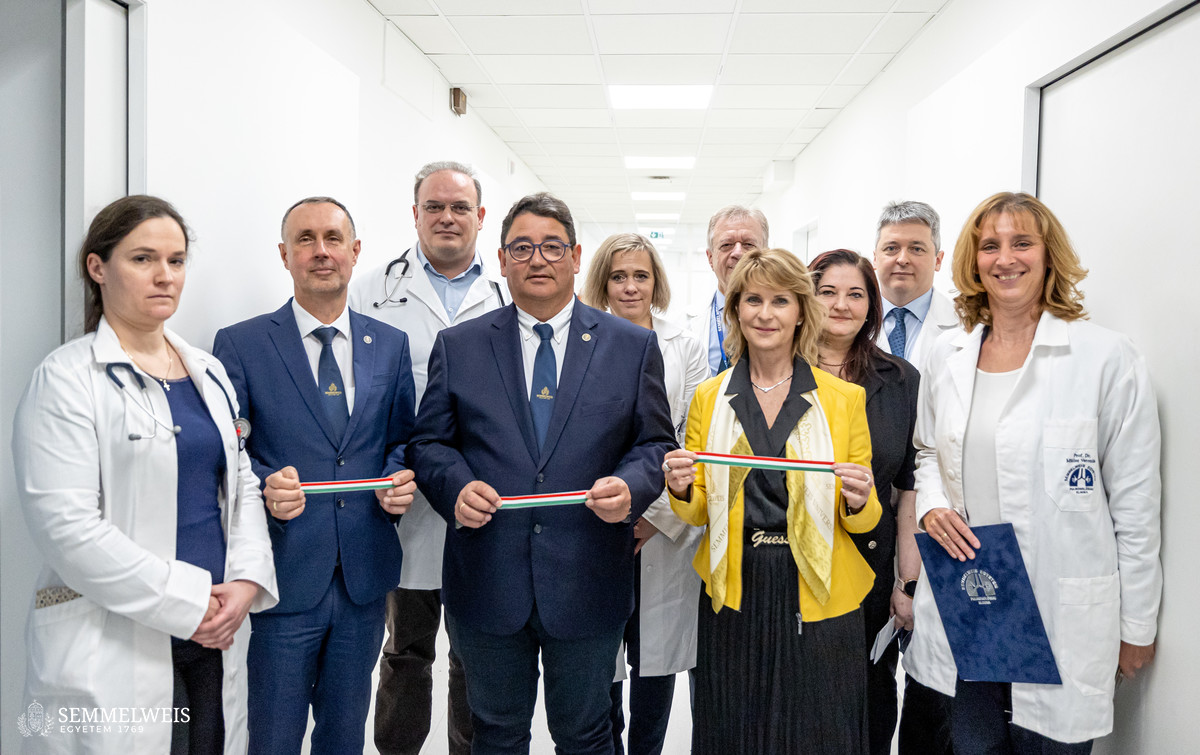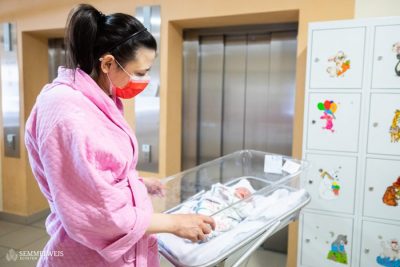At the anniversary ceremony, Dr. Béla Merkely recalled that pulmonary medicine became part of medical education at Semmelweis University in 1942, when the Department of Pulmonary Medicine was founded. The Rector mentioned several changes that have taken place in the institution: the clinic moved to its current location in the summer of 2019, in the Tömő Street building, which could not be celebrated due to COVID-19.
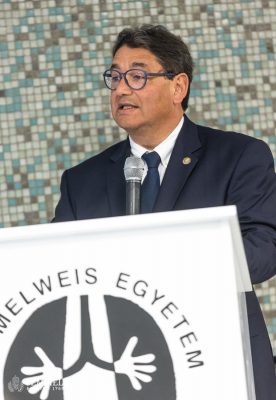 He underlined that Semmelweis University quickly took the lead in the fight against the virus, and the Pulmonology Clinic was a strong bastion from the very beginning: under the leadership of Dr. Veronika Müller, the Tömő Street block became a COVID care institution, unique in the world. He added that life at the clinic has not stopped: there has been continuous bedside teaching and high quality research work. The rehabilitation department has been completed and is already operational, and at the end of last year the building received new windows and insulation thanks to a KEHOP development.
He underlined that Semmelweis University quickly took the lead in the fight against the virus, and the Pulmonology Clinic was a strong bastion from the very beginning: under the leadership of Dr. Veronika Müller, the Tömő Street block became a COVID care institution, unique in the world. He added that life at the clinic has not stopped: there has been continuous bedside teaching and high quality research work. The rehabilitation department has been completed and is already operational, and at the end of last year the building received new windows and insulation thanks to a KEHOP development.
Dr. Béla Merkely emphasized that colleagues can now work here in a multidisciplinary environment, in conditions that meet the requirements of 21st century pulmonary medicine, in close proximity to allied professions.
Among other things, the institution operates as a pulmonary hypertension centre, a centre of excellence for interstitial lung patients, with a sleep laboratory, oncology care and a well-equipped non-invasive ward, he pointed out.
He added that the deterioration of air quality and the damaging effects of climate change are expected to place even greater burdens on the institution in the future – but the clinic has already proven that, like Semmelweis University, it can move forward in the most difficult times.
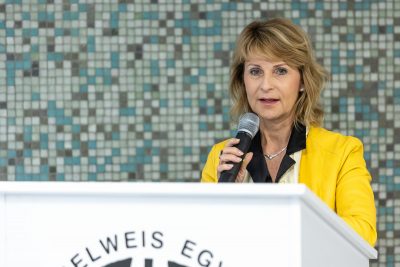 In her welcome speech, Dr. Lívia Pavlik, Chancellor of the University, recalled the infrastructural developments of the past period. The building of the clinic on Tömő Street was renovated with 1.8 billion euros of funding, adding that work on the functionality of the building is still ongoing. The replacement of the entire building’s windows and the external thermal insulation were carried out with grant funding. The bronchology operating theatre block, which is internationally outstanding, has been completed and the handover of the respiratory rehabilitation unit is nearing completion. The chancellor stressed that the next investment will be the modernisation of the heating and ventilation systems. As she pointed out, a significant part of the improvements will be carried out with continuous patient care, and she thanked the staff of the clinic for their perseverance and adaptability.
In her welcome speech, Dr. Lívia Pavlik, Chancellor of the University, recalled the infrastructural developments of the past period. The building of the clinic on Tömő Street was renovated with 1.8 billion euros of funding, adding that work on the functionality of the building is still ongoing. The replacement of the entire building’s windows and the external thermal insulation were carried out with grant funding. The bronchology operating theatre block, which is internationally outstanding, has been completed and the handover of the respiratory rehabilitation unit is nearing completion. The chancellor stressed that the next investment will be the modernisation of the heating and ventilation systems. As she pointed out, a significant part of the improvements will be carried out with continuous patient care, and she thanked the staff of the clinic for their perseverance and adaptability.
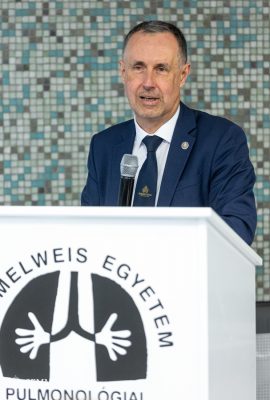 Dr. Attila Szabó, Vice-Rector for Clinical Affairs, gave a brief overview of the last 80 years of the field. He pointed out that the biggest challenge in 1942, the year the clinic was founded, was the treatment of patients with tuberculosis, which was incurable at that time. In the following decades, TB slowly declined, but has not disappeared completely, while new diseases such as asthma and COPD have emerged and lung cancers have become increasingly prominent. Over the following decades, the clinic focused on curing and researching these diseases. In the 21st century, the care of oncology patients remains a major challenge, but there have been many changes in both diagnostics and therapy,” the Vice-Chancellor pointed out, noting that asthma care remains important, but the number of hospitalizations has been greatly reduced thanks to therapeutic options. Improvements in smoking, air pollution and premature infant survival have created new challenges for pulmonology, with the emergence of young, non-smoking COPD patients and other pathologies such as interstitial lung diseases.
Dr. Attila Szabó, Vice-Rector for Clinical Affairs, gave a brief overview of the last 80 years of the field. He pointed out that the biggest challenge in 1942, the year the clinic was founded, was the treatment of patients with tuberculosis, which was incurable at that time. In the following decades, TB slowly declined, but has not disappeared completely, while new diseases such as asthma and COPD have emerged and lung cancers have become increasingly prominent. Over the following decades, the clinic focused on curing and researching these diseases. In the 21st century, the care of oncology patients remains a major challenge, but there have been many changes in both diagnostics and therapy,” the Vice-Chancellor pointed out, noting that asthma care remains important, but the number of hospitalizations has been greatly reduced thanks to therapeutic options. Improvements in smoking, air pollution and premature infant survival have created new challenges for pulmonology, with the emergence of young, non-smoking COPD patients and other pathologies such as interstitial lung diseases.
Dr. Attila Szabó also mentioned that in addition to the development of patient care at the clinic, significant progress has been made in education and research, new innovative developments have been made in recent years; publication activity has increased, and the training of PhD students is ongoing.
“The Department of Pulmonology is a leader in the diagnosis and treatment of pulmonary diseases in Hungary, its scientific activities are internationally recognized and its teaching is highly rated by students,”
– said the Vice-Rector.
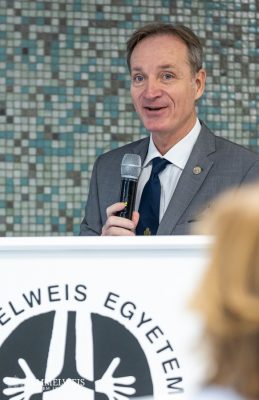 Dr. Nándor Ács, Deputy Dean of the Faculty of Medicine, mentioned the world-class care of lung transplant patients and transplant recipients in Hungary as one of the professional highlights of the past period. “In the past five years, the clinic has been haunted by two unfortunate events, which the clinic community has overcome successfully and moving forward. First, the sudden move out of the former building, and then the coronavirus pandemic, which placed the greatest burden on pulmonology, in addition to the intensive care units,” the deputy dean pointed out.
Dr. Nándor Ács, Deputy Dean of the Faculty of Medicine, mentioned the world-class care of lung transplant patients and transplant recipients in Hungary as one of the professional highlights of the past period. “In the past five years, the clinic has been haunted by two unfortunate events, which the clinic community has overcome successfully and moving forward. First, the sudden move out of the former building, and then the coronavirus pandemic, which placed the greatest burden on pulmonology, in addition to the intensive care units,” the deputy dean pointed out.
The rest of the ceremony included scientific presentations, first of all Dr. Veronika Müller, Director of the Institute, spoke about the professional and infrastructural developments of the past five years, in which she remembered the great predecessors, former directors of the clinic and the most important developments they created. Turning to professional development, she emphasized the transformation of undergraduate education, with pulmonary medicine being taught in a block teaching format for the last five years in a complex unit with thoracic surgery. Postgraduate education is supported by the large textbook on Pulmonology and by a number of specialized textbooks in the target areas, to which the staff of the clinic have contributed as editors or authors of chapters, she pointed out. As she stressed, maintaining and further strengthening the scientific performance is a priority, and several major research projects have been undertaken, especially in the context of COVID.
The rest of the program also covered the development of lung cancer care, non-invasive respiratory support, care of rare lung diseases, invasive pulmonary diagnostics, respiratory rehabilitation, obstructive lung diseases such as COPD and sports asthma, and specialist care of lung patients. New research findings in advanced therapy of interstitial lung diseases were also presented. Finally, COVID results, challenges in infectious diseases of the lower respiratory tract and lungs were presented.
Bernadett Bódi
Translation: Gábor Kiss
Photo: Attila Kovács – Semmelweis University
